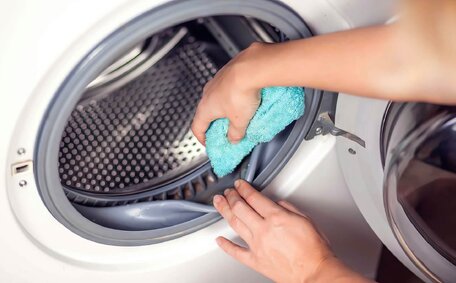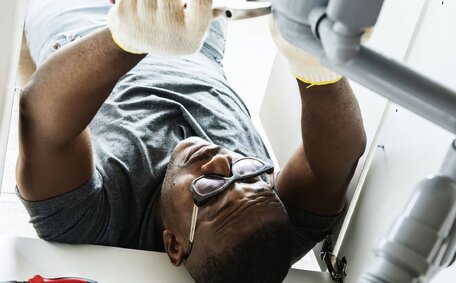How Rust Forms Inside Pipes Over Time
Rust formation inside pipes is driven by a natural chemical process known as corrosion. As metal pipes, including those made of copper, age, they are exposed to moisture and oxygen, resulting in gradual deterioration from corrosion.
In Cambridge Park, factors such as acidic soil can accelerate the corrosion of underground water pipes. In such cases, replacing compromised pipes is crucial to prevent structural failures. Older homes with outdated rusty pipes can be particularly vulnerable to corrosion within your plumbing infrastructure.
Corrosion, a major plumbing issue, leads to pitting and buildup inside pipe walls. Within your hot water system, rust, a red-brown solid, is the most prevalent byproduct of corrosion. Accumulations of rust flakes and scales can constrict drain pipes over time, reducing their diameter and impeding water flow.
If unchecked, corrosion can progress inside your pipe walls, which begs the question of what can be done to protect their structural integrity. It also can cause health risks by allowing contaminants to enter your water supply. In some instances, replacing your corroded plumbing is necessary to ensure optimal water quality and flow.
Understanding rust formation enables Cambridge Park homeowners to spot early indicators of potential blockages, such as rusty water in their drains. This allows for proactive maintenance to address your rusty pipes, ensuring that rusty water in your plumbing doesn’t become the norm.
Blocked Drains: The Effects of Rust and Sediment Buildup
As rust flakes and sediment build up inside your home’s water pipe walls, even your shower drain’s functionality becomes severely impacted. Decreasing drainage speed and gurgling noises can indicate emerging clogs that disrupt water flow.
When drains are fully blocked, backed-up water can lead to mildew growth and other significant issues within your home. Your kitchen sink bathroom and bathroom fixtures can overflow, flooding the immediate area. In most cases, routine maintenance can prevent issues, but tree root intrusions may occasionally worsen the situation, causing sewage to back up into homes.
Clearly, full blockages and other plumbing problems cause significant inconvenience, home damage and health hazards. Yet even partial clogs they can cause hamper drainage as you might start to see water coming out, pooling back. By impeding water flows, sediments out your need make sure not to hinder the self-cleansing action vital for drainage pipes further down the line to function.
With gravity as the driving force transporting waste downstream, over time water with any protruding rust or debris in the pipes causing narrowing of the diameters will increasingly obstruct water flows, necessitating the use of a chemical drain cleaner or a professional service. Over time, the rust and sediment accumulation reaches critical levels, stalling drainage around your house completely.
Corrosion, an inevitable process, puts Cambridge Park homes with old, rusting pipes at risk of blocked drains. Knowing how to catch and address rust issues early with drain cleaning, and understanding how much maintenance or replacement is needed, is crucial.
Warning Signs of Rust Issues in Your Plumbing
There are a few key warning signs that may indicate rust issues lurking within your Cambridge Park plumbing:
Discoloured Water
Red, brown, or yellow-tinged water or altered fixtures upon turning on the tap usually signify corroded pipes releasing rust into the water. Rusty residues or sediment coming out from your taps is a clear indication, it’s a sign of corrosion within your plumbing system.
Reduced Water Pressure
Low water pressure becomes apparent over time as corrosion deposits narrow pipes, restricting flow. Significantly low water pressure or dripping taps, especially during peak usage, may warrant investigating and potentially replacing due to rust buildups.
Strange Tastes or Odours
An unexpected metallic taste in your tap water or rotten egg smell, which can also stem from hard water, may indicate rust corrosion. This indicates possible cold water contamination, making it unsafe for consumption.
Other subtle signs include frequent drain clogging, banging pipes or new visible corrosion spots. Though easy to overlook initially, addressing these early allows for preventative repiping to avoid future drainage disasters.
If you detect any of these warning signs in your Cambridge Park property, contact our team to schedule a service to inspect your pipes. Our licensed plumbers have the camera equipment and expertise to diagnose issues in your water main and address any rust problem before they escalate into burst pipes or health hazards.
Preventing Rust Formation and Drain Blockages
Rust prevention requires active monitoring of your Cambridge Park plumbing to avert serious issues. Regular habits such as monthly visual inspections and using sink strainers can help detect smaller issues early. You can take initiative on your own by mitigating pipe corrosion risks:
- Avoid pouring fats, oils down, or food waste down your drain, or letting them spill over drain openings to prevent blockages
- Don’t flush wet wipes, toilet paper, or other items in excess that can get stuck on the inside of pipes
- Install pipe insulation to regulate temperature fluctuations
- Consider repiping older galvanized steel lines with pvc pipes or copper
To address minor clogs caused by rust flakes or hair buildup in your water heater pipes, a home remedy of baking soda and vinegar can be effective. Mix 1 cup of baking soda with 1 cup of vinegar, pour this natural cleaner into the blocked drain, leave it for 30 minutes, then rinse with boiling water. This method can remove minor blockages from your drains.
For more advanced cases like persistent clogs or experiencing tree root intrusion, it’s time to call for CCTV drain inspections and professional hydrojetting. Catching issues early is key to prevent damage your pipes and drain damage.
Clearing Existing Rust-Related Clogs and Blockages
For minor rust-related clogs or early blockages, there are some handy remedies to administer down your drains before calling a professional.
Using a simple plunger can generate enough suction to dislodge obstructions and restart drainage flows. Firmly place the plunger over the drain outlet and vigorously plunge 10-15 times, ensuring a secure seal.
For partial soft blockages in your blocked pipes, a baking soda and vinegar treatment may also work to break down rust deposits. A mixture of 1 cup baking soda followed by 1 cup white vinegar can act as a natural drain cleaner when run through your pipes. Let the fizzing chemical reaction sit for 5-10 minutes then rinse with hot water.
If home remedies fail to clear stubborn blockages, potentially causing severe problems, contact our professional plumbing team. We have industrial-grade hydrojetting equipment that can scour away rust buildup and debris, restoring full drainage capacity. Where sections of pipe are severely corroded, pipe relining or replacement may be necessary.
Don’t hesitate to ask what to do about persistent rust issues by contacting Cambridge Park’s local drain specialists. Blocked drains left untreated risk further damage your property, causing flooding and health hazards.
Seeking Professional Help for Severe Rust Problems
If DIY solutions cannot clear severe pipe rust issues or persistent blocked drains that need replaced, it is crucial to seek professional assistance. Here at Cambridge Park Plumbing, our fully licenced team has the advanced equipment and expertise to comprehensively assess and address concerning rust problems.
We understand the hazards that severe corrosion poses within ageing pipe systems. Our trenchless pipe relining strengthens failing pipes, including those under your front yard tap, with minimal disruption.
If uncontrolled deterioration threatens your property’s plumbing integrity or water quality, swift action is needed. Where replacement is necessary, our minimally invasive methods ensure minimal disruption to your home or yard.
We offer 24/7 emergency plumber services when urgent issues arise.
With our local expertise, the Cambridge Park plumbing team can handle the most complex plumbing challenges.
Long-Term Solutions: Pipe Replacement and Relining
Homes with severely rusted pipes and persistent blockages often require substantial renovation of their plumbing systems for a long-term solution. Methods like full replacement or trenchless relining can essentially renew your property’s plumbing infrastructure.
Pipe Replacement
Severely rust-damaged pipes necessitate full replacement. Our team excavates to access damaged pipes then installs new piping, typically using durable PEX or copper. Though disruptive, this completely eliminates ongoing issues with hazardous rust accumulation.
Pipe Relining
Alternatively, pipe relining is a trenchless technology that renews pipe interiors without digging. We insert an epoxy resin coating that seals corrosion damage and creates a smooth, rust-resistant barrier. Relining revives the flow capacity and durability of the pipes.
Longer-term investments in the plumbing of ageing Cambridge Park properties often prove to be cost-effective. Replacement and relining not only thwart further corrosion but also significantly enhance water flow and drainage by clearing blockages.
Contact our friendly team to discuss the best whole-of-house solution including main sewer line maintenance for your situation. With advanced trenchless technologies and minimally invasive installation methods, Cambridge Park Plumbing can efficiently restore your plumbing integrity.





